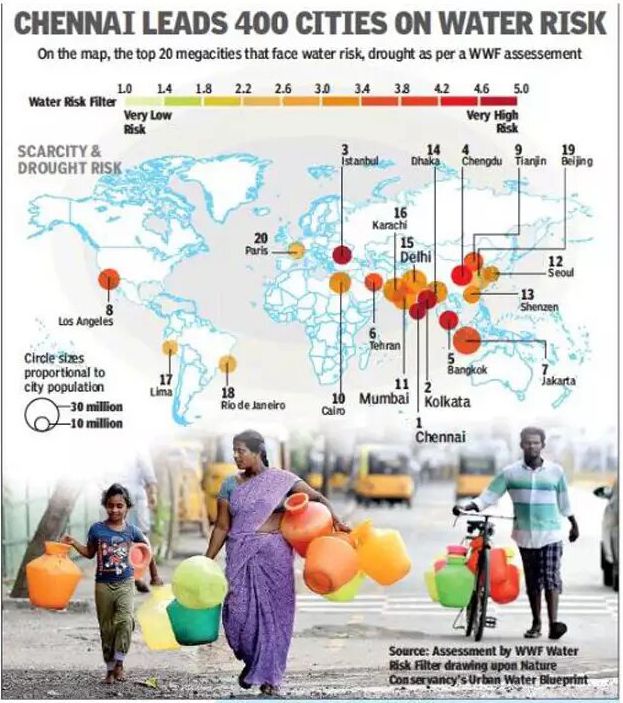Biodiversity & Environment
Water Vulnerable Megacities in India
- 25 Jun 2019
- 3 min read
Four Indian cities, Chennai, Kolkata, Mumbai and Delhi have been ranked among the top 20 megacities in the world facing high levels of water scarcity.
- A study by World Wildlife Fund (WWF) evaluated 400 cities globally in 2018 with focus on megacities facing high combined levels of water scarcity — recent and projected drought.
Megacities
- Megacities are quantitatively defined as cities having a population of more than five, eight or ten million people.
- Because of their defining features, concentration of population, goods and services, megacities are particularly vulnerable to water-related risks, which are further amplified by climate change: large-scale flooding, pollution of water sources, water shortages etc.
- Faced with such difficulties, these cities also host a multitude of resources, including technical, scientific and human resources, to meet the challenges ahead.
- Chennai has emerged in top position as the city facing the most severe water scarcity and drought in the world.
- Kolkata has been ranked at number 2, Mumbai at 11 and Delhi at 15.
- Large cities, mostly located along the banks of large rivers, are vulnerable to water scarcity because of the vastly over-allocated and mismanaged river-systems.
- Frequent droughts and flooding due to climate change and depleting levels of water in the reservoirs are some of the reasons behind the water crisis in these megacities.
- Loss of wetlands is a key reason. Reports have noted that the world has lost 35% of its wetlands since 1970 and is losing them three times faster than forests.
- As the wetlands shrink, the city loses its natural waste water tank, and in the absence of enough sewage treatment plants, the wastewater goes straight into the river.
- East Kolkata Wetland, a Ramsar site is an example of the case.
The World Wildlife Fund (WWF)
- The WWF was founded in September, 1961, at the International Union for the Conservation of Nature and Natural Resources (IUCN)'s headquarters in Morges, Switzerland.
- As an international fundraising organization it is working in collaboration with existing conservation groups and bring substantial financial support to the conservation movement on a worldwide scale.







